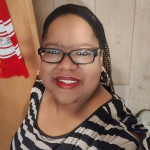Nairobi, Kenya
Positive since 2012
I’m known as Joji Baro, which is a short form of George Barasa. About five years ago, I was the first person to come out on national television in Kenya as both gay and HIV positive. I’m a contemporary artist and accomplished activist based in Nairobi.
Through my creative pieces of work, I share my personal experience as a gay man living positively with HIV.
Living in Kenya, I’ve had my own share of success. But things have not always been rosy; I have also had challenges. I have been insulted and assaulted simply for being gay and HIV positive.
It is a crime in Kenya to be gay; sodomy is a felony punishable by 14 years’ imprisonment. It is even worse when one is also HIV positive. Religious people claim that being HIV positive is the wages of being gay. I face double stigma and discrimination.
In 2016, I released the first Kenyan gay music video called "Same Love” (Remix) by Art Attack, which was banned by the government, and a warrant for my arrest was issued. This triggered the hashtag #kenyangayvideo going viral across all social media, and my video was watched over 300,000 times on YouTube.
Sometimes I sit down and think I’m not a good singer, but each time I try to make an effort to sing better, institutionalized hate tries to stop me. Am I that bad that no one would like to hear me out?
My family ejected me from home for being gay, and I had to drop out of school due to lack of money. That’s how I became an activist and artist. I have been evicted and arrested countless times for being gay. Against all odds, I have successfully built my niche in the entertainment and human rights sector. What breaks my heart is that I cannot achieve simple things in life, such as finding the love of my life. People avoid me either because I’m openly gay or HIV positive.
I’ve learned about humanity from being HIV positive. I learned to love everyone. I learned to overcome my suicidal thoughts, learned to be a changemaker. I run a shelter that hosts LGBTI refugees from more than 13 countries. I feed them, clothe them and house them. I believe I’m the gay version of Mother Teresa. My calling is to serve the people. I love my country, and I pay taxes. I live a peaceful life here in Nairobi knowing that one day Kenya will be like the United States; it will be like the United Kingdom or South Africa. I am a strong believer in humanity.
What three adjectives best describe you?
Down-to-earth, simple, humble.
What is your greatest achievement?
Finishing my high school education.
What is your greatest regret?
I wasn’t patient and persistent.
What keeps you up at night?
I sleep late because I like reading books. My favorite is Pedagogy of the Oppressor.
If you could change one thing about living with HIV, what would it be?
I would change the name itself to something less discriminating and less likely to cause stigma.
What is the best advice you ever received?
Eat everything. Eat all kinds of food. Search anytime, anywhere.
What person in the HIV/AIDS community do you most admire?
Ashton [P. Woods] the U.S.-based HIV activist.
What drives you to do what you do?
Death. I’m afraid that I might die before I see change, so I try to bring change myself.
What is your motto?
I want to leave this world a better place.
If you had to evacuate your house immediately, what is the one thing you would grab on the way out?
Nothing—because worldly things are materialistic. Nothing is more important than my life.







3 Comments
3 Comments